#Viking Tools
Explore tagged Tumblr posts
Text
youtube
12 notes
·
View notes
Text




Markland Merchants – Vikingr (Raider) – Type L Fighting Axe
This hafted version of the Markland Merchants Raider Axe is a robust, real axe meant for serious reenactors and enthusiasts and was designed by a Viking reenactor who wished to make a higher quality and more accurate Viking axe available. It is crafted to a higher level of quality than many other axes with attention paid to fit and finish, such as the fitting of the axe to the stained Hickory haft being tailored to each haft by using the historical techniques of clamping and bending the points of the axehead into the wood to make it very closely fitted to the haft and highly resistant to movement. The fitting of the axe socket is futher enhanced by a sheet of malleable copper to form-fit the interior of the axe socket to the haft which is a fine bit of practical detailing that is historically accurate, but rarely executed with modern replicas. Please Note: we recommend using Butchers block wax to re-seal and moisturize the handles to keep them from drying out and shrinking over time. Replacement hafts will be made available in the near future.
“Vikings” is the modern name given to seafaring people originally from Scandinavia (present-day Denmark, Norway, and Sweden), who from the late 8th to the late 11th centuries raided, traded, and settled throughout parts of Europe. Our Petersen Type L fighting axe, which we have called the Vikingr, is one that any Viking warrior of the time would have been proud to carry and is based on the dimensions and weights of historical examples. The head weighs approximately 1lb, and when mounted on a haft of the right length – it becomes a very quick and balanced weapon that is an absolute joy to wield. If you close your eyes, you can almost hear the sails rippling in the wind, feel the salt spray on your face, and taste the sea air seasoned with a slight hint of burning thatch.
#Kult of Athena#KultOfAthena#New Item Wednesday#Markland Merchants#Vikingr (Raider) – Type L Fighting Axe#Raider Axe#Type L Fighting Axe#Axe#Axes#Hatchets & Tomahawks#Viking#Vikings#Viking Tools#Viking Weapons#1060 High Carbon Steel#Battle Ready#Petersen Type L#8th century#9th century#10th century#11th century#Migration Period#Dark Ages#Dark Age Weapons#European Weapons#Scandinavian Weapons#Danish Weapons#Norwegian Weapons#Swedish Weapons
4 notes
·
View notes
Text

Iron Axe Head, c.700-1000CE, Stewartry Museum, Kirkcudbright, Dumfries and Galloway, Scotland
This axe head was found in a submerged canoe in Loch Doon on the northern border of Galloway Forest Park. It is a Danish or Norse axe similar to other Viking axes found across Scotland. The context of the find (c. 1820s) is something of a mystery - could this have been a Viking boat burial?
Experimental archaeology has shown that these axes were formidable weapons. A single heavy axe stroke could penetrate a wooden shield and cut off the arm that carried it. We also know that Vikings used axe-heads like this for graffiti. Hundreds of runes and drawings were made by Norsemen in the Neolithic cairn Maeshowe in Orkney, and the carvings from Torrs Cave were perhaps also made in this way.
#viking#vikings#axe head#axe#weapons#archaeology#metalwork#metalworking#ancient cultures#ancient living#ancient design#tool#viking life#viking burial#viking warrior#Scotland#Kirkcudbright#dumfries and galloway
59 notes
·
View notes
Text
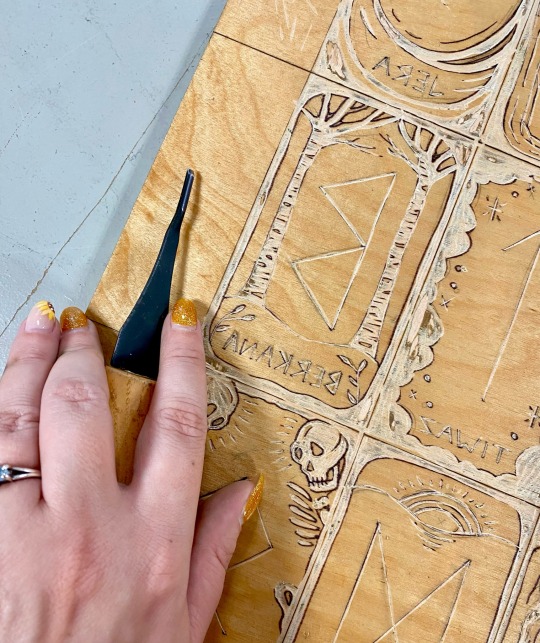
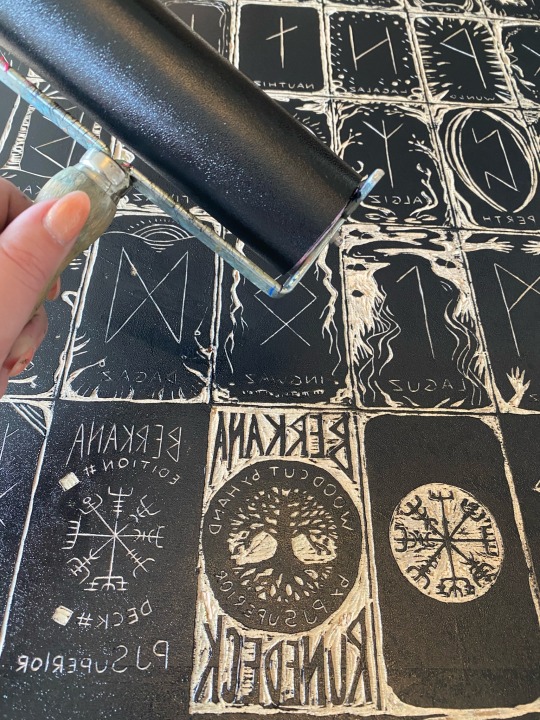
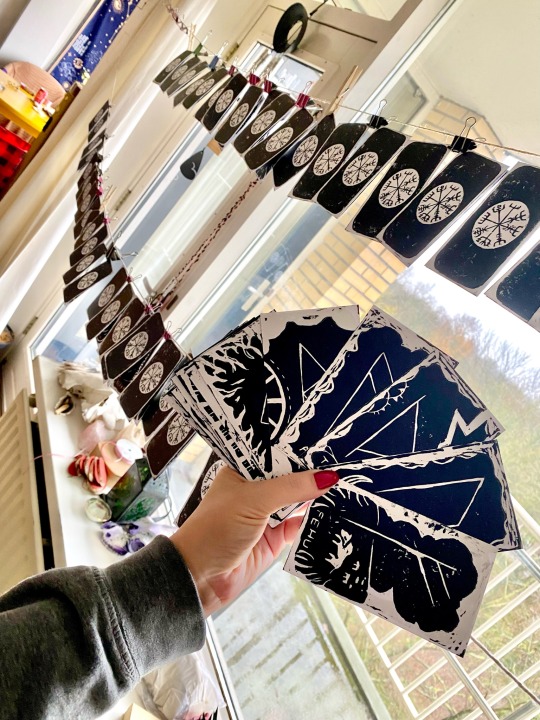
BERKANA woodcut print rune deck hand made by PJ Superior features each of the 24 Elder Futhark runes (plus a ”Wyrd” card) carved by hand into birch wood and printed in a hand cranked barrel press. (The backs printed with a spoon.) Along with the rune symbols, each associated Norse word along with a simple, deeply meaningful illustrative border is carved into the wood from which these cards are printed. The Norse rune symbols are still the main visual focus.
The woodcut print method used to create this hand crafted set of cards ensures that the wood carving typical of the most ancient sets of casting runes is still present in this contemporary deck.
I call this rune deck BERKANA after the 18th rune in the Elder Futhark alphabet, because it means “birch” which is the same type of wood used for the carving of this deck. In runic divination, Berkana represents growth, renewal, and hope.
A home made guide booklet, sewn by hand, is included to share interpretations for divination. The guidebook includes cultural background and history of the Elder Futhark runes, as well as insights into the inspirations and meanings of the artistic imagery accompanying each symbol.
Limited edition of 50 funded via Kickstarter
A handful of decks now available:
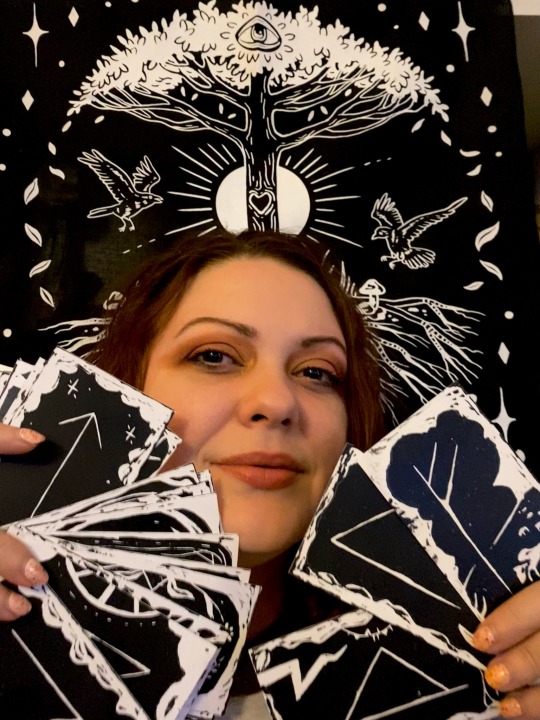
#norse runes#rune deck#divination tools#Viking#norse paganism#elder futhark#rune cards#woodcut#printmaking#vegvisir#rune magic#nordic#runes#tarot cards#oracle#fortune telling#folk witchcraft
121 notes
·
View notes
Text

.IRON 'N' COBBLE
#ines's scribbles#skyblock kingdoms#vikingpilot#.having LOTS of fun with just drawing with the line tool and the mouse#.will def play around and draw more skyblockers in this style this is NICE#.also we didn't break viking's spine like we did with youmjer. alas. maybe someone elses spine will be jelly for art
53 notes
·
View notes
Text
Iron Age
Why is it that when you are young,
your father’s tools feel as if they have been
around forever, since the dawn of man,
since before some war or other when things
were made by hand and not just in factories
or the shelves at big box stores; the metal
darkened by use, and heavy, the handles
smooth and perfect to the touch; they were
your grandfather’s tools, so your father
probably felt the same way when he was
a young boy who prized his three flannel
shirts and trinkets kept in a an old cigar box
as if that were some custom passed down
from the gods; I can only imagine the children
of Vikings gathering polished stones from
the stream, collecting them in the warming
sun to dry and finding that the wetness was
their magical power to glimmer like gold,
storing them in a wooden gourd or some
old leather bag, mixed in with the arrowheads
and beads and buttons, and when they got
home, handling father’s hammer as if it were
treasure, and his war-axe as if it were fire.
-GeorgeFilip
#poem#poetrythreesixfive#poetry#georgefilip#spilledink#poetryportal#poetsandwriters#poetsontumbler#spilledwords#deepthoughts#fathers#sons#fathers and sons#tools#vikings#axe#reminiscing#old days
3 notes
·
View notes
Text

2 notes
·
View notes
Text
Transcript; "Helluu! 😊 Sooo eh one time me and my ex went to Oslo and we went to a kiosk and we tried to order a hot dog with uh "ROBBEL OG RAKJE" and we also tried to order a uh "SJU TE VÉRS" and uh the lady she just kept asking us if we could "repeat that" because she... had no idea what we were... talking about!"
@namelessrammgirl
________
Here we have a big bottle of SJU TE VÉRS
("7 to the air"/7up)
Actual its a SLANKE SJU TE VÉRS ("diet 7 to the air/7up!")

#robbel og rakje = Rubble/everything and a rake (garden tool to collect dead leaves for example)#this expression just means that you want everything and anything so on a hot dog that means you want mustard..ketchup..onion..everything#and Sju t vérs/sju te vérs = “seven in the air” and that is a dialect slang for a 7up! 😂#norwegian dialects#try and go to oslo and order a hamburger or a hot dog like this its so funny!#norsk#norwegian#the viking answers
3 notes
·
View notes
Text
Unlocking the Ancient Wisdom: Exploring the Mystical World of Runes
Shaina Tranquilino
August 30, 2023
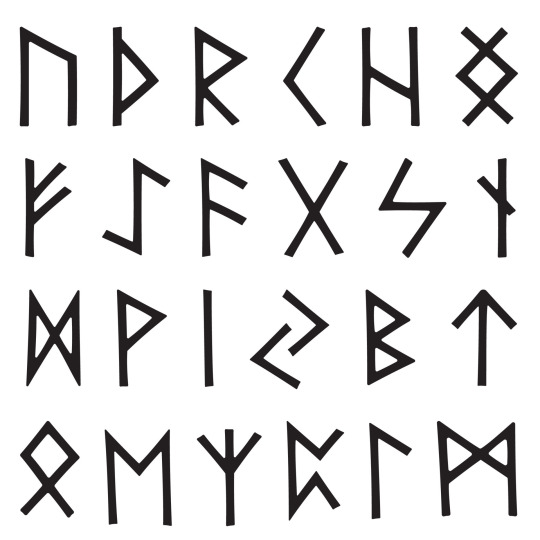
If you take the time to observe and look around, we are surrounded by ancient symbols and mystical practices. Runes stand out as one of the most fascinating forms of divination and communication. Originating from ancient Germanic and Norse cultures, these enigmatic characters have captivated scholars, historians, and enthusiasts alike for centuries. In this blog post, we will embark on a journey to uncover the secrets behind runes and explore their significance in contemporary society.
What are Runes?
Runes are a system of ancient alphabets used by various Germanic tribes such as the Vikings during the early Middle Ages. These characters were typically inscribed onto stones, wood, or metal objects and carried deep symbolic meanings. Each rune represents a specific sound, but they also hold broader associations with natural elements, gods/goddesses, and various aspects of life.
The Origins of Runes:
The exact origins of runes remain shrouded in mystery. However, many scholars believe that they evolved from older writing systems like Etruscan or Anglo-Saxon scripts. The earliest known runic inscriptions date back to around 150 AD and can be found across Northern Europe.
The Rune Alphabet:
The runic alphabet is known as "Futhark," derived from its first six letters: Fehu (wealth), Uruz (strength), Thurisaz (thorn), Ansuz (divine breath), Raido (journey), and Kaunan (torch). Over time, different versions emerged within different regions, resulting in variations such as Elder Futhark, Younger Futhark, and Anglo-Saxon Futhorc.
Divination with Runes:
One of the primary purposes of runes was divination – seeking insight into future events or guidance in decision-making processes. To perform a rune reading or casting, practitioners would traditionally draw runes from a bag or scatter them on a cloth, interpreting their meanings based on their positions and interactions.
Each rune carries its own unique symbolism, allowing for nuanced interpretations. Some common interpretations include Fehu representing wealth and abundance, Thurisaz symbolizing protection or defense, and Raido signifying journeys or travel.
Runes in Contemporary Society:
Despite being rooted in ancient cultures, runes have not lost their relevance in modern times. Many individuals find solace in exploring the wisdom embedded within these symbols and seek to incorporate them into their spiritual practices. Runes are often utilized for meditation, personal growth, intention-setting rituals, and even as decorative elements in jewelry or artwork.
In popular culture, runes have made appearances in various forms of media such as books, movies (e.g., "The Lord of the Rings"), and video games (e.g., "The Elder Scrolls" series). These depictions have further fueled curiosity about runes among enthusiasts worldwide.
Runes continue to captivate our collective imagination as powerful symbols of ancient wisdom and divination. Whether you approach them from an academic perspective or seek personal connection through spirituality, exploring the world of runes can be a transformative experience. As we unravel the secrets behind these enigmatic characters, let us honour the knowledge they carry by embracing their lessons with reverence and respect.
#runes#rune wisdom#ancient runes#runic symbols#mystical meanings#Norse tradition#rune magic#divination tools#magical insights#runic journey#spiritual guidance#power of runes#Viking wisdom#sacred symbols#runic readings
6 notes
·
View notes
Text
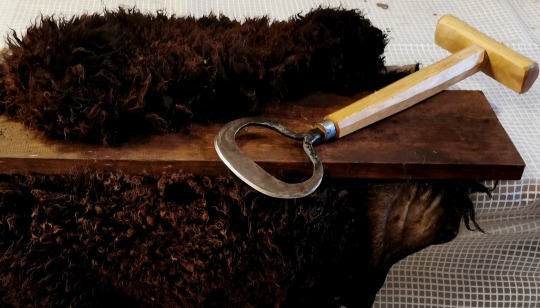
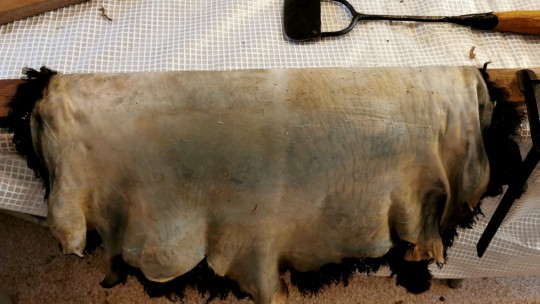
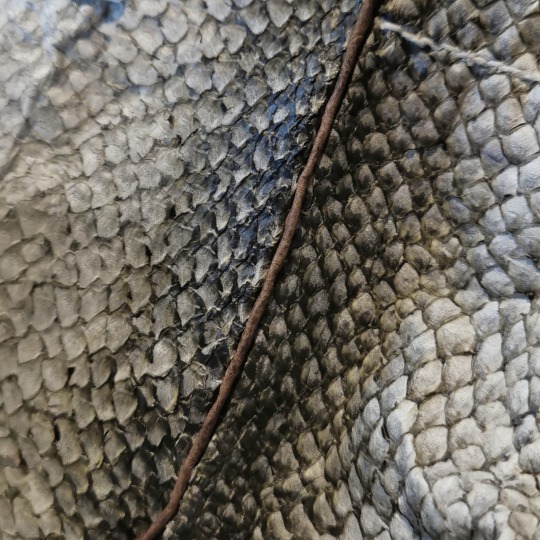
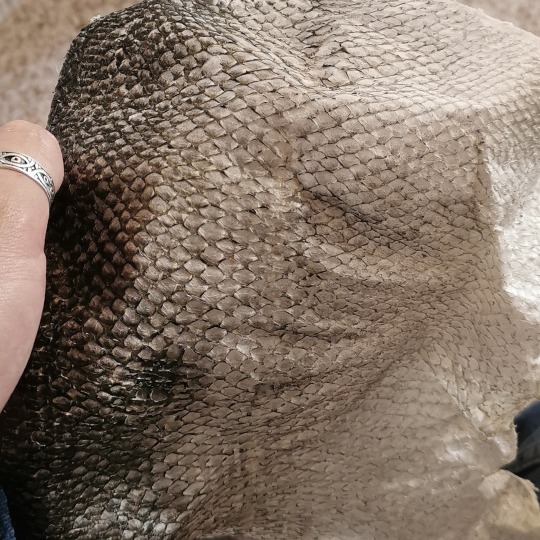
Pictures I took during a historical skin tanning course 🐏🐟
Sheep and salmon in pictures. We also did bass, marten, weasel and squirrel. Fat and alum tanning
#history#viking#historic reenactment#medieval#reenactment#photography#tools#🦊#Tanning#Leather#Skin#Fat tanning#Alum tanning#Historical tanning
5 notes
·
View notes
Text
youtube
Viking Age Tools and the Mighty Mästermyr Tool Chest
6 notes
·
View notes
Text

This hafted version of the Markland Merchants Raider Axe is a robust, real axe meant for serious reenactors and enthusiasts and was designed by a Viking reenactor who wished to make a higher quality and more accurate Viking axe available. It is crafted to a higher level of quality than many other axes with attention paid to fit and finish, such as the fitting of the axe to the stained Hickory haft being tailored to each haft by using the historical techniques of clamping and bending the points of the axehead into the wood to make it very closely fitted to the haft and highly resistant to movement. The fitting of the axe socket is futher enhanced by a sheet of malleable copper to form-fit the interior of the axe socket to the haft which is a fine bit of practical detailing that is historically accurate, but rarely executed with modern replicas.
Available to order now.
#Kult of Athena#KultOfAthena#Markland Merchants#Vikingr (Raider) – Type L Fighting Axe#Raider Axe#Type L Fighting Axe#Axe#Axes#Hatchets & Tomahawks#Viking#Vikings#Viking Tools#Viking Weapons#1060 High Carbon Steel#Battle Ready#Petersen Type L#8th century#9th century#10th century#11th century#Migration Period#Dark Ages#Dark Age Weapons#European Weapons#Scandinavian Weapons#Danish Weapons#Norwegian Weapons#Swedish Weapons
4 notes
·
View notes
Text
What cutie mark do you think the Nordics would have
#i thinking of making dans a battle axe or a viking boat but I i think itd be cute to incorporate daisies into the design#for Iceland im thinking a whale or a volcano or something#swe something like tools or building related and norway something??magic??#idk about finland#emil.txt
2 notes
·
View notes
Text
Completely free AI generator. It allows you to create realistic characters and scenes, among other things. KLICK!


#ai art#ai#ai generated#bandcamp#ai artwork#love#love is love#lbgtq#lbgqt#bald#men#sexy#bearded man#viking#ai gallery#homosexual#kiss#strong#free ai tool#perchance#org#parquet courts#beauty#men beauty#Bandcamp#smile#beautiful smile#face#glasses#eyes
0 notes
Text
Premier Ship Models Launches RC Models
Abu Dhabi, UAE, 2024: Renowned model ship provider Premier Ship Models has announced the launch of radio-controlled (RC) models in the UAE. After the successful launches of corporate, bespoke, and kit model ships, the RC models are the natural extension of their vast offerings.
RC Model Ships
Known for superior quality and customizations across the US, UK, Australia, and France, the award-winning model ships producer introduces the maritime experience for ship model enthusiasts in the UAE. RC model ships are controlled by specially designed remotes that use radio waves to operate marine gadgets. Premier Ship Models has launched a massive collection of RC models. The model sizes range from 1:50 to 1:300. The collection includes magnificent ships, such as the African Queen, Alte Liebe, Anteo, Bismarck, Calypso, Elbjorn Icebreaker, Titanic, and many more. Their latest offering boasts some of the top-notch RC yachts, such as Dragon Force 65, the classics Scharhorn Steam, Binary Cat, and Victoria Luxury. That is not all, powerful sports motors, such as Super Mono, and Bullet are also included for those in search of a thrilling marine experience.
The wide collection of model boats controllable by radio-remotes is curated keeping both adult and young customers in mind. Buyers can choose from wooden, metallic, and other finishes. The specialist model maker has also made many customization options available to give buyers that sense of pride in owning these beauties. Customers can get the ships and boats personalized with name plates, finishes, and colors. For those with a creative flair, Premier Ship Models offers model ship kits that add engineering and creative coloring to the marine experience. Customers can choose from building the entire boat, assembling parts, or only painting. Customization kits and acrylic paints are separately available allowing buyers to pick their favorites. Premier Ship Models also provides toolboxes to help customers build their boats with greater precision. Radio Remotes must be purchased separately, depending on the model and level of customization chosen. The ship model maker’s customer services team is available 24/7 on the website chat handle to assist buyers in selecting the right model boats, kits and the ideal remote for their chosen ships or boats.
About Premier Ship Models
Premier Ship Models offers exceptionally crafted tankers, yachts, bulk carriers, and container ships to enable all enthusiasts to fulfill their love for boating, and shipping. With over 2 decades of experience in delivering model ships to marine fans, Premier Ship Models is a reputed name in the industry. The ship model maker has established itself as a trusted and reliable provider of superior-quality boats, accessories, and services. It has over 199 custom projects under its belt showing its commitment to quality. The Queens Awards for Enterprise: International Trade is a testament to their excellence. Their services include bespoke corporate orders for ready-made models and kits, personalized model boats, 3D printing, architectural models, model ship restoration and rendering. The total collection has over 500 ready-made and custom options. In addition, the model-maker offers sophisticated display cases for customers to show off their possessions.
0 notes
